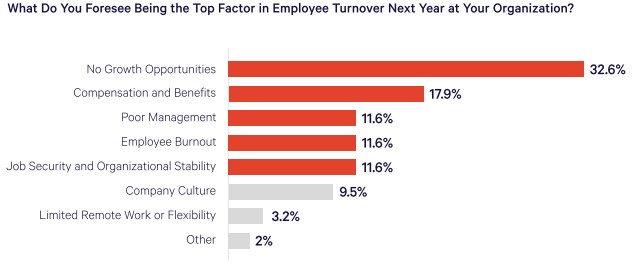In today’s dynamic work environment, employees are not just seeking jobs; they are pursuing career journeys. If you were to gauge your workforce’s sentiment on growth opportunities within your organization, would they express enthusiasm about available career development programs? Or would they feel stagnant, lacking pathways for upskilling and reskilling?
A compelling statistic from McKinsey reveals that a significant 41% of employees have left their jobs due to a perceived lack of career advancement prospects. This underscores a critical reality that HR and Learning & Development professionals are acutely aware of. Our own research at Together, highlighted in the “Enterprise L&D in 2025: Predictions and Trends” report, corroborates this, forecasting that limited career growth will be a primary driver of employee turnover in the coming years.
The graph illustrates the understanding among HR and L&D professionals regarding the strong correlation between employee turnover and the absence of career growth opportunities.
While the problem of limited growth opportunities is evident, the solutions are multifaceted. Developing robust career advancement programs is crucial for connecting employees to pathways for professional development. This article will delve into the essence of career development programs, providing a step-by-step guide on how to implement them effectively. We will also draw inspiration from successful companies that have leveraged these programs to foster employee growth and organizational success.
Understanding Career Development Programs
Career development programs are strategically designed frameworks that align employee capabilities, individual needs, and long-term career aspirations with both present and future opportunities within an organization. These programs are not merely about filling roles; they are about empowering employees to thrive within the company and throughout their entire professional trajectory. The components of these programs are diverse, ranging from external certifications and industry conferences to internal initiatives like peer mentorship programs.
Typically, career development is conceived as an ongoing, immersive experience integrated into an employee’s work life, emphasizing on-the-job learning. However, it can also encompass more structured approaches. Academic career development involves employees participating in formal courses offered by educational institutions to gain specialized knowledge. Similarly, intensive bootcamps provide focused, short-term training in specific hard skills, designed to rapidly upskill employees or facilitate career transitions. Whether focusing on upskilling for current roles or reskilling for new career paths, the core objective remains consistent: fostering employee growth and adaptability.
The Indispensable Role of Career Development Programs
For HR and L&D professionals, the imperative of investing in talent development is self-evident. It’s not just a matter of employee retention—it’s a strategic move to cultivate a more resilient, engaged, and agile workforce. While effective employee training demands significant effort, the return on investment is substantial.
Here are key advantages that career development programs bring to your organization:
Enhancing Employee Retention
Career development programs are powerful tools for bolstering employee retention rates. By addressing employees’ needs for personal and professional growth, these programs cultivate loyalty and reduce turnover.
💡 Remarkably, 94% of employees indicate they would remain with their current employer if the company invested in their career development. This statistic from LinkedIn’s Workplace Learning Report underscores the profound impact of growth opportunities on employee loyalty.
Investing in employee growth strengthens your employer brand and cultivates a positive company culture. Employees recognize and value organizations that prioritize their development, fostering long-term commitment. This proactive approach to career development becomes a cornerstone of a successful employee retention strategy.
Facilitating Upskilling and Reskilling Initiatives
A well-structured career development plan ensures that employees remain current with industry trends and evolve with their roles. Through targeted upskilling and reskilling opportunities, employees are prepared for future roles and the evolving needs of the company.
In many instances, this strategic approach eliminates the need for external hiring. Instead, organizations can cultivate internal talent pipelines, developing existing employees to transition into new positions. This strategy yields significant benefits, including reduced hiring costs and minimized onboarding time, as internal candidates already possess valuable company knowledge and cultural understanding.
Cultivating Future Leaders through Leadership Development
Career development programs are instrumental in shaping future leaders within your organization. By incorporating leadership development tracks, these programs hone crucial decision-making and cross-functional skills. High-potential leadership programs are particularly effective in identifying and nurturing employees with leadership capabilities.
Integrating a robust leadership development program into your overall career development strategy builds a strong leadership pipeline. It equips both emerging and established managers with the essential skills to navigate organizational change and drive sustained success. This proactive approach ensures leadership continuity and strengthens the organization’s capacity for future growth.
Real-World Examples of Successful Career Development Programs
If you’re seeking inspiration for your own career advancement program, examining companies that have achieved notable success can provide valuable insights. Here are six compelling examples of career development programs in action:
1. Marriott International
Marriott International demonstrates a strong commitment to early career development programs, yielding impressive results. Their hotel internship programs offer recent graduates a unique opportunity to complement their academic learning with practical, hands-on experience under the guidance of industry experts. Furthermore, their Voyage Leadership Development Program provides both new and existing employees with specialized management skills training while simultaneously expanding their professional networks. This comprehensive approach underscores Marriott’s dedication to nurturing talent from the ground up.
2. Workday
Workday leverages a skills-based HR strategy, empowering employees to identify and pursue specific skill development goals. Their career development program facilitates opportunities for employees to collaborate with diverse teams across the company, broadening their skill sets and gaining fresh perspectives on their career paths. Since its inception in 2021, Workday’s program has garnered positive feedback from participants, highlighting its effectiveness in fostering employee growth and skill diversification.
3. Randstad
Randstad, a global leader in HR services, implements professional mentoring programs as a cornerstone of their employee development strategy. By meticulously tracking turnover rates and employee engagement among program participants, Randstad has quantified the tangible benefits of mentorship. Their data reveals a significant 49% reduction in turnover, coupled with a more engaged and motivated workforce. This data-driven approach showcases the impactful role of mentoring in enhancing employee retention and engagement.
4. Ethena
Ethena exemplifies how smaller companies can seamlessly integrate core values into their career development programs. Specializing in interactive compliance training, Ethena extends access to its comprehensive course catalog to its own employees. This includes a wide range of topics, from DEI and unconscious bias training to leadership skill-building and industry-specific expertise. By investing in their employees’ holistic development, Ethena reinforces its values and empowers its workforce.
5. Aflac
Beyond its well-known duck mascot, Aflac is recognized for its robust career development programs. Aflac’s Career Success Centers provide employees with personalized career counseling services. Employees can schedule appointments with career counselors to explore their professional aspirations and identify pathways for advancement within the company. Aflac’s career advancement initiatives encompass diverse activities, including Career Insights sessions, which offer employees direct interaction with company leaders from various departments. These sessions provide invaluable insights into the skills and knowledge required for success in different roles, fostering transparency and career clarity.
6. Accenture
Accenture demonstrates a substantial commitment to employee development, investing nearly $1 billion USD annually in career development programs. This IT and professional services giant prioritizes keeping employee skills at the forefront of industry demands. Their initiatives range from supporting external certifications like Salesforce and AWS to providing comprehensive leadership training and honing specialized, industry-specific skill sets. Accenture’s commitment ensures that employees across all levels of the organization have ample opportunities for continuous learning and professional growth.
Numerous companies are realizing significant benefits from well-designed career development programs. For further exploration, delve into examples of the best company training programs available.
Best Practices for Building an Effective Career Development Program
Having established a solid understanding of career development programs and their importance, let’s explore practical strategies for implementation. Here are key best practices to guide you in building a successful and impactful career advancement program:
Define Target Employee Groups for Program Participation
The first step in developing your program is to determine which employee segments will be the primary focus. Will the program cater to early-career professionals, high-potential employees earmarked for leadership roles, or underrepresented talent pools? Understanding your target audience is crucial for tailoring program content. Analyze the specific skills, preferred learning formats, and relevant topics for each cohort. This targeted approach ensures that the program resonates with participants and effectively addresses their unique developmental needs.
Foster Collaborative Development Plans with Managers and Employees
Individual Development Plans (IDPs) are essential for personalized career growth. An IDP is a customized roadmap based on an employee’s unique career aspirations and personal development requirements.
Instead of presenting employees with a generic catalog of courses, IDPs offer a tailored approach. This personalized strategy empowers employees to pursue short-term and long-term career goals while enhancing their current job performance. The IDP process is a collaborative partnership between managers and employees, emphasizing ongoing dialogue, constructive feedback, and proactive preparation. This ensures that development plans are relevant, actionable, and aligned with both individual and organizational objectives.
Integrate Mentorship to Guide Employee Growth
Incorporating a workplace mentorship program provides significant advantages, particularly for junior employees. Mentorship offers invaluable guidance and support, accelerating career progression. Even senior executives can benefit from reverse mentorship, gaining fresh perspectives from junior colleagues.
Career mentors play a vital role in helping mentees clarify their career goals and providing strategic guidance on achieving them. Integrating a mentoring program into your broader career development framework strengthens employee support systems. Mentorship fosters deeper employee engagement and contributes to a more connected and collaborative company culture.
Empowering Employees on a Trajectory of Growth
A robust career development program is not merely a tool for employee retention—it is a fundamental investment in building a stronger, future-ready workforce. These programs empower employees to refine their skills in current roles, navigate career progression within the organization (whether through traditional ladders or modern career lattices), and explore diverse career pathways.
Providing employees with the necessary tools and resources to support their growth is paramount to their professional fulfillment and organizational success. Platforms like Together’s mentoring software streamline the creation and management of career advancement programs, consolidating administrative tasks and enhancing participant convenience.
Discover how Together’s mentoring software can empower your career development program—request a demo today.

